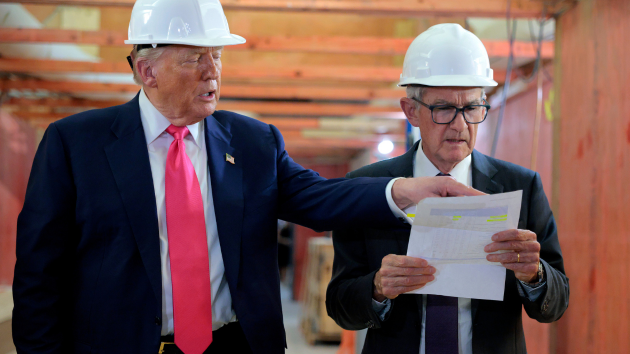The secret to a successful sports car company? Build more SUVs
Written by ABC Audio ALL RIGHTS RESERVED on July 2, 2023

(SANT’AGATA BOLOGNESE, Italy) — Enthusiasts scoffed, guffawed and protested when Porsche, maker of the venerated 911 sports car, launched its Cayenne sport utility vehicle in 2002. The large SUV boosted the marque’s sagging sales, winning over Porsche loyalists.
The Italians took notice.
These days, Lamborghini factory workers in Sant’Agata Bolognese, Italy, are busy filling orders for the Urus, a high-performance SUV that has attracted new customers and electrified sales.
Demand for the Urus eclipses the company’s slinky Huracan and Aventador supercars, accounting for more than half of the company’s deliveries. Lamborghini sold 5,367 Urus units last year compared to 3,113 Huracans and 753 Aventadors — a record for the Italian brand.
Lamborghini recently added the Urus Performante model, which bolts from 0 to 62 mph in 3.3 seconds and packs 657 horses under a twin-turbo V8 engine. The 5,314-pound Performante rides like a luxury SUV on highways and masterfully maneuvers twisty back roads in Sport mode.
More than 20,000 Urus units have been sold since its launch. A hybrid version will be unveiled at the end of 2024.
“When we originally announced in 2012 our intention to create an SUV, we were absolutely convinced we would reach unprecedented volumes,” Andrea Baldi, CEO of Automobili Lamborghini America, told ABC News. “Since its debut in 2017, customer feedback has been exceptional. Within the vehicle’s first four years to market, over 80% of Urus customers have been new to the brand.”
He added, “The demand for Urus remains above supply and insensitive to the macroeconomics trends.”
The popularity of SUVs, though loathed by sports car aficionados, can actually benefit companies and drivers alike, argued Ed Kim, president and chief analyst at AutoPacific.
“Porsche is flush with capital because of the Cayenne and Macan SUVs,” he told ABC News. “We’ve seen some amazing and insane sports cars from Porsche recently. If you look historically at sports car brands introducing SUVs, the same predictable thing keeps happening: the SUV ends up being the big revenue generator. They help provide the funding to develop the sports cars these brands are known for.”
The “Ferrari faithful” may have “clutched their pearls” when the storied Italian marque finally acquiesced to consumer demand and said it was developing an SUV, Kim said. Ferrari has already begun production of the Purosangue, an exclusive and expensive new model that challenges the Urus and Cayenne Turbo. The wait-list is deep; a spokesperson told ABC News production is sold out for two years.
“The Purosangue ensures the viability of Ferrari of generations to come,” Kim said. “There was an unmet need among Ferrari customers for an SUV-type vehicle. People will want this.”
Sports car brands can no longer snub the SUV, said Autoweek editor Natalie Neff, who pointed to the upcoming Corvette SUV from Chevrolet.
“To be successful, you need to be in the SUV segment,” she told ABC News.
And a high-performance SUV does not mean the thrill of driving a sports car ends, she noted.
“The Urus is a really good example. It still has the Lamborghini feel and delivers the same type of performance you’d expect from a sports car,” she said.
Italian automaker Maserati now has two SUVs on the market: the handsome Levante, which debuted in 2016, and the all-new Grecale, a compact crossover.
“We’ve evolved a bit from a sedan-based company to a purveyor of luxury performance SUVs and supercars,” Bill Peffer, CEO of Maserati North America, told ABC News.
The athletic Grecale is available in three powertrains — a 296 horsepower turbo-four, a 325-hp turbo-four and a 523-hp twin-turbo V6 — and debuted in showrooms in January. Sales are so strong that it’s quickly become the brand’s bestseller, replacing the Levante.
“The SUV is the largest luxury segment. One in three vehicles sold [in the U.S.] is in this segment,” noted Peffer.
Alfa Romeo, the Italian marque with a historic racing pedigree, recently revealed its second SUV, the Tonale. The plug-in hybrid joins the Alfa Romeo Stelvio, a stylish SUV that entered the market in 2017. The Tonale will compete in the premium compact sport-utility segment and offers 285 horsepower from a 1.3-liter turbocharged engine.
Kim said the introduction of the Tonale will get consumers talking again about the struggling brand.
“Alfa Romeo has not had a new product since the Stelvio launch,” he said.
Peffer pointed out that Maserati is also seeing a ton of interest in its MC20, the company’s flagship supercar that makes 621-hp from a twin-turbo V6 engine.
The stunning coupe and convertible “kicked off our product renaissance,” said Peffer. “There is huge demand for the MC20 in the market. We don’t have any more to sell” in 2023, he added.
Lamborghini and Ferrari have also rolled out new supercars in the past two years: the Lamborghini Revuelto and Sterrato and Ferrari 296GTB and Roma.
With fewer sports cars on the road, however, automakers will have to keep expanding their SUV lineups to stay profitable and relevant to the next generation of motorists.
“The SUV body style still remains hugely aspirational among millennials,” Kim said. “SUVs bring in younger buyers and help cultivate loyalty and interest in the brand.”
Neff said she laments the day when these Italian brands decide to cease production of their legendary coupes and convertibles.
“It would be a sad world if there were no more sports cars,” she said.
Copyright © 2023, ABC Audio. All rights reserved.
 KVSP
KVSP 



